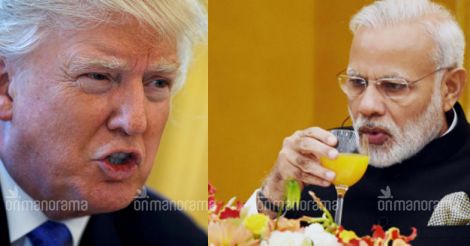Finance and defense minister Arun Jaitley, who is the closest adviser of prime minister Narendra Modi, had a first hand encounter on the priorities of American president Donald trump during his visit to Washington last month.
Jaitley, the key member of cabinet committees of security and economic affairs, got the wish list of the Trump administration from India itself. Though there was an expectation that Trump might invite Jaitley for a chat, there was no such surprise from the maverick president.
When Jaswant Singh, the external affairs minister in Atal Behari Vajpayee's government had visited the capital of United States, the then president George W. Bush had dropped by for an unscheduled chat, which marked the beginning of talks for the civil nuclear deal.
The Trump administration has had other priorities both in the domestic and international arena since the new president took charge of the United States on January 20. The president has not even appointed a new ambassador of United States to India.
But now, Trump has invited Modi for a visit to Washington in June for the first face to face encounter of the popularly elected leaders of the two big democracies.
An assessment by the external affairs ministry is that no unfavorable policy decision against India has been taken during the first 100 days of the president. Even the review ordered on the issuance of H1B visas for foreign workers has not barred Indian technology workers but asked for ending abuses of the system over the years.
Immigration officials have said three Indian companies have manipulated the system by submitting larger number of applications than required. Infosys was one of the companies named and the company responded by announcing creation of 10,000 jobs in Indiana, the home state of vice-president Mike Pence, who is pro business and influences Trump's decision making. If Tata Consultancy Services and Cognizant, which are the other two major beneficiaries of the visa program also adapt similar innovation, then the H1B issue would have been simplified to a large extent by the time Modi lands in Washington.
India's top priority is for United States using its powers to restrain Pakistan, which has escalated the proxy war against India in the last six months, through terrorist attacks in Kashmir Valley and the latest barbaric attack on Indian soldiers by Pakistan army.
Home minister Rajnath Singh suspects Pakistani hand in the escalation of street violence in Kashmir. But the American government is more focused on Islamic State in west Asia and Taliban in Afghanistan.
Trump, during his first foreign trip, is planning meetings with leaders of major Muslim countries in Saudi Arabia. India will be keenly watching whether Pakistan will attend the summit and then, what will transpire between Trump and prime minister Nawaz Shariff.
Washington's top priority is different in relations with India. Top finance and commerce department officials have conveyed that India must change its intellectual property rules as United States feels Indian companies, especially in the field of medicines, are giving tough competitions to American companies.
While America calls these rules as unfair, India has argued the rules are needed to make medicines available at cheap prices for the patients. United States also wants India to open up the financial sector further.
But allowing free market economics can put constraints on prime minister's pet projects such as Mudra and Jan Dhan.
Nevertheless, the Indian officials feel the relations are on a steady expansion, which began during Bill Clinton's presidency and developed during the two-term presidencies of Bush and Barack Obama. It will be interesting to see what kind of a public relations show will be put up by Modi and Trump, both of whom are known for grand gesturing.

























 Donald Trump, Narendra Modi
Donald Trump, Narendra Modi